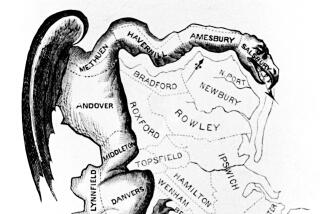The Thicket of Gerrymander
- Share via
The explanation of gerrymandering offered to us by Daniel H. Lowenstein (Editorial Pages, Oct. 7), “Turnabout Isn’t Always Fair Play” is high-minded, academic, and quite partisan. That crafty and devious Republican Party, he believes, is out to upset the scales of justice by somehow stacking the deck against us honest but ignorant voters. If Lowenstein would present this issue in the impartial manner normally required of academicians we would probably come away from his article with a different and more accurate opinion.
He might mention that in the last national election the popular vote for members of the House of Representatives was split between the two parties 51% (Democrats) to 49% (Republicans). This somehow does not square with the proportions of representatives who showed up in Washington a few weeks later.
The point is that gerrymandering is an entrenched political reality, bluntly and successfully pursued by the Democratic side, bitterly struggled against by the Republican side. I appreciate the author’s disclaimer that neither side is pristine. I don’t like gerrymandering, I don’t like what the Republicans have apparently done in Indiana, and I realize that both sides will continue this practice within legal bounds. But since this article purports to be impartial yet leaves out very important background information, I can’t help but think that his real intent is to influence public opinion--at the expense of facts. It bothers me that a scholar should so abuse his credentials.
JONATHAN B. SCHMIDT
San Diego


